Key Takeaways
- The application of AI in healthcare is transforming the ways we approach the treatment, diagnosis, and management of diseases.
- It brings faster results, fewer errors, and more personalized care.
- Still, it has downsides like data risks, lack of empathy, and high costs.
- It’s not a replacement for doctors, but it’s a powerful tool when used right.
What Is AI in Healthcare?
AI in healthcare means using smart computer programs to help in treating patients, finding diseases, and managing hospitals. These programs can think, learn, and improve over time. That’s what makes them “artificial intelligence.”
You may have already seen artificial intelligence in medicine. It shows up in apps that track your heart rate, robots that help in surgery, and chatbots that answer health questions. It’s even in tools doctors use to spot cancer early.
So, when people say AI in medicine, they don’t mean robot doctors. They mean machines that assist doctors.
How AI Works in Healthcare Services?
When you visit a doctor, you provide symptoms, test results, and history. AI in healthcare works by gathering that data and using healthcare AI technology to look for patterns. These systems learn from past cases. Every time they see more data, they improve. For instance, AI diagnostics tools analyze thousands of X‑rays to learn what disease markers look like.
Some tools use predictive analytics in healthcare: they can forecast which patients might need special care soon. Others turn clinics into smarter systems by handling appointment reminders, lab results tracking, and even follow‑ups.
All of this is part of AI in the medical field, smart helpers that assist doctors in scanning patient data quickly and making better decisions.
How AI Applications Are Revolutionizing Healthcare?
Hospitals can be slow and crowded. Doctors are often tired. Mistakes happen. But artificial intelligence in healthcare is changing all of that.
Here’s how:
- AI-powered healthcare tools help in early disease detection
- AI in medical imaging detects small issues in scans like MRIs and X-rays.
- AI for patient monitoring allows doctors to keep track of patients at home
- Healthcare automation takes care of repetitive tasks like scheduling
These smart tools help doctors focus on what really matters, saving lives.
Pros of AI in Healthcare
Improved Diagnostic Accuracy
Doctors are amazing. But even they can miss things. With AI diagnostics, machines can help spot diseases early sometimes even before symptoms appear.
These systems are trained on millions of cases. That means they can often find rare issues that most doctors don’t see every day. This leads to quicker, better decisions.
This is one of the major benefits of AI in healthcare; more accurate answers, in less time.
Efficiency and Time-Saving
With AI and healthcare, things just move faster. AI tools can scan reports, schedule appointments, and even remind patients to take medicine.
This gives doctors more time to listen to patients, instead of typing notes or doing paperwork. Hospitals become less crowded, and care becomes smoother.
That’s why many hospitals are turning to healthcare ai technology for help.
Personalized Treatment Plans
Everyone’s body is different. What works for one person might not work for another. This highlights the importance of AI in personalized treatment as a revolutionary development.
AI studies your full medical history, lifestyle, and even your genes. Then it helps doctors create a plan just for you. That means fewer side effects and better results.
This is one of the most powerful benefits of AI in healthcare care that fits you, not just the disease.
Remote Patient Monitoring
With smart devices like watches and patches, doctors can now monitor patients without them even coming to the clinic.
AI for patient monitoring can check your blood pressure, sugar levels, and more in real-time. If something goes wrong, it sends an alert right away.
This helps patients stay safe at home, and it helps hospitals reduce long stays. Another solid win for AI in healthcare.
Cost Reduction
Running a hospital is expensive. Tests, staff, equipment; it all adds up. But AI in medicine helps cut costs in many ways.
Faster diagnosis, fewer errors, better planning; all this saves time and money. In the long run, it means cheaper treatment for patients too.
That’s why even small clinics are adopting artificial intelligence in medical field tools.
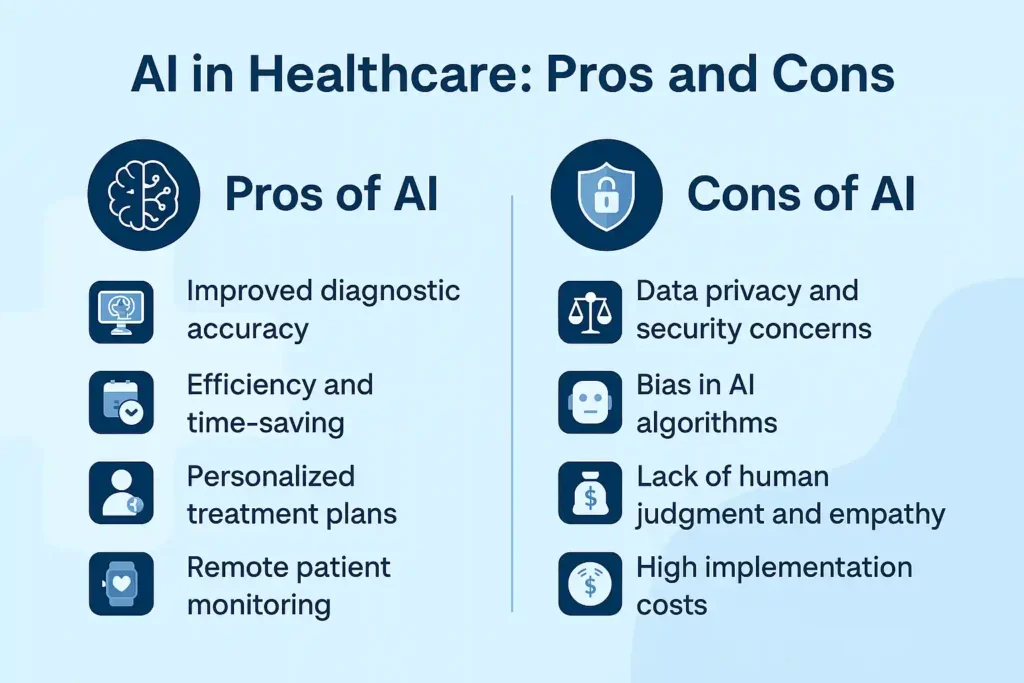
Cons of AI in Healthcare
Data Privacy and Security Concerns
To work well, AI needs data and lots of it. This includes personal health records. But what if that data leaks?
Data privacy in medical AI is a big concern. If hackers steal this data, patients could face major risks. It’s like giving away your whole health history.
Without strong security, the disadvantages of AI in healthcare can be very serious.
Bias in AI Algorithms
AI learns from old data. If that data has mistakes or is unfair, the AI will be too.
This is called AI bias in healthcare. For instance, an AI system may not function well for other groups of individuals if it is primarily educated on data from one of them.
Bias can lead to wrong treatments, or even missed diagnoses. That’s a real problem.
Lack of Human Judgment and Empathy
A machine might be smart, but it doesn’t have feelings. It doesn’t see a patient’s fear, or understand pain like a human does.
This is why it is crucial to have human oversight in AI-driven medicine. AI can aid doctors, but it should never replace the human connection.
This is one of the biggest disadvantages of AI in healthcare; machines don’t care. Doctors do.
High Implementation Costs
Setting up AI in healthcare systems is not cheap. Hospitals need new tools, trained staff, and tech support.
In small or rural areas, this may not be possible. That’s why the limitations of AI in healthcare include the high cost to get started.
Even when the tools work well, not every place can afford them.
Regulatory and Ethical Uncertainty
Who is responsible if AI gives the wrong advice? How do we make sure AI stays fair? These are tough questions.
Ethical issues in AI use are still being discussed. Governments are working on rules, but things change fast.
Until then, there’s a lot of grey area and that’s risky for patients and doctors alike.
AI in Practice: Real-World Examples
- In England, the NHS launched Flok Health, an AI-powered healthcare tool phone app that runs physio sessions. It cut back‑pain wait times by 44% and clinic hours by hundreds per month.
- Stamford Health in the U.S. uses AI during mammograms. The same scan now also checks heart disease risk by looking for artery signals, offering two health checks at once with no extra radiation. That is a clever artificial intelligence in healthcare example.
- In Kenya, the AI Consult tool supports AI in clinical decision-making. Doctors got pointers during visits. Errors dropped significantly. This shows how ai in healthcare examples can improve care in everyday clinics.
- Aidoc’s AI platform reviews CT and MRI scans in seconds, alerting radiologists to strokes or bleeds instantly. Hospitals using it see faster triage and fewer missed emergencies, a clear win for artificial intelligence in medicine.
- At MIT Jameel Clinic, researchers used AI to find new antibiotics that kill drug‑resistant bugs. These breakthroughs show how artificial intelligence in medical field helps speed up life‑saving research.
Conclusion
Artificial intelligence in healthcare is not just a cool idea. It’s already here helping doctors, saving time, cutting costs, and improving patient care.
But it’s not perfect.
The pros and cons of AI in healthcare must be carefully weighed. While ai in healthcare examples show big wins, the disadvantages of AI in healthcare cannot be ignored.
Machines can think. But they can’t feel. That’s why the future must be built on trust, safety, and teamwork, between humans and technology.
FAQs
How is AI used in healthcare?
AI analyzes medical images, records, genetics. It supports diagnostics, treatment planning, remote monitoring, drug research, and doctor workflows via healthcare ai technology.
Where is AI used in healthcare today?
Hospitals use it for imaging, clinics use chatbots, wearable sensors monitor patients at home. Research labs use it for new drug discovery and early disease detection tools.
What are the three applications of AI in healthcare?
Diagnosis via scans, AI for patient monitoring, and personalized treatment planning are top real-world uses of artificial intelligence in medicine.
What is the best AI in healthcare?
The top tools vary. Aidoc leads in imaging, Stanford labs use deep learning for drug discovery. The best depends on whether you need diagnostics, imaging, or research.
When was AI first used in healthcare?
While early ideas emerged in the 1970s, major practical use of AI in healthcare only accelerated in the 2010s with more data and smarter tools.
Who is the father of AI in healthcare?
Dr. Edward Shortliffe is widely seen as an early pioneer in artificial intelligence in medicine, for his work in the 1970s on rule‑based medical systems.
What are the different types of AI used in healthcare?
Common types include machine learning for diagnostics, deep learning for imaging, natural language processing for notes, robotics for surgical help.
How does AI reduce human error in healthcare?
It reviews vast data fast, alerts doctors to anomalies, and flags risky cases long before they become mistakes, boosting both speed and safety.


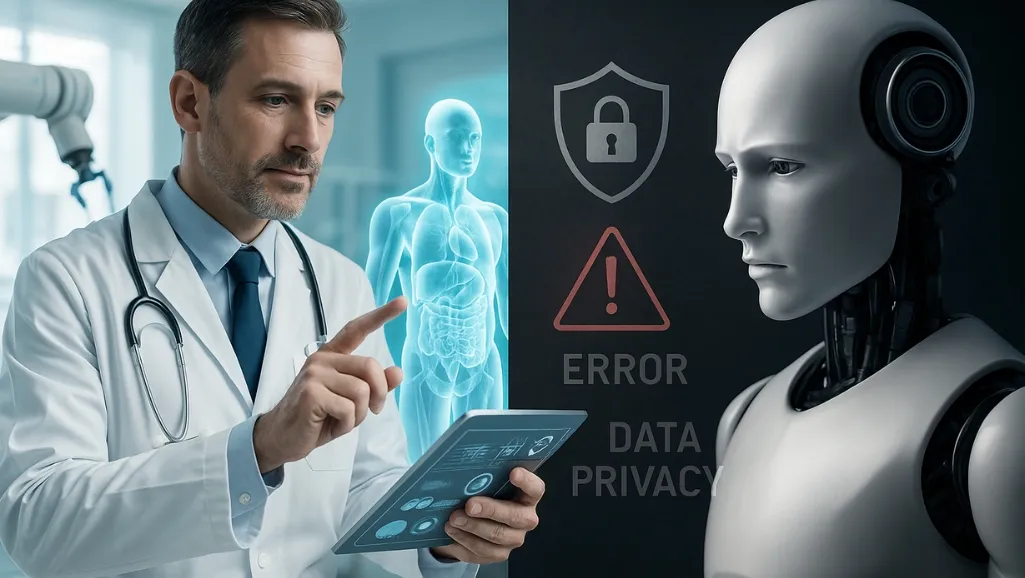
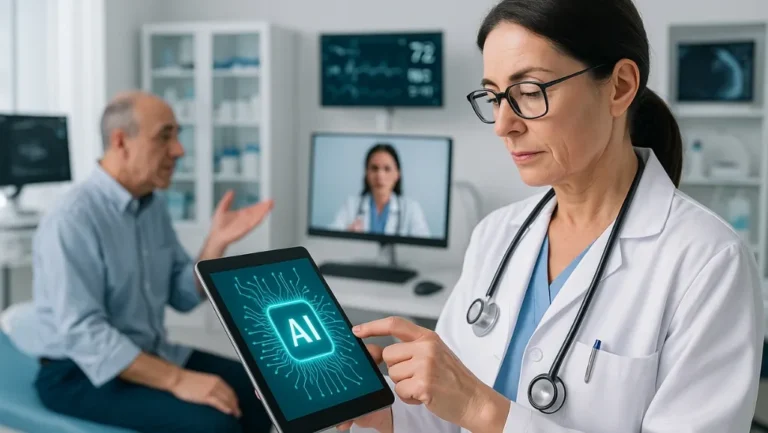
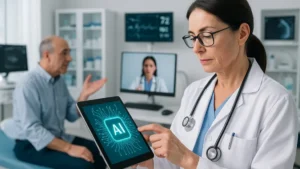
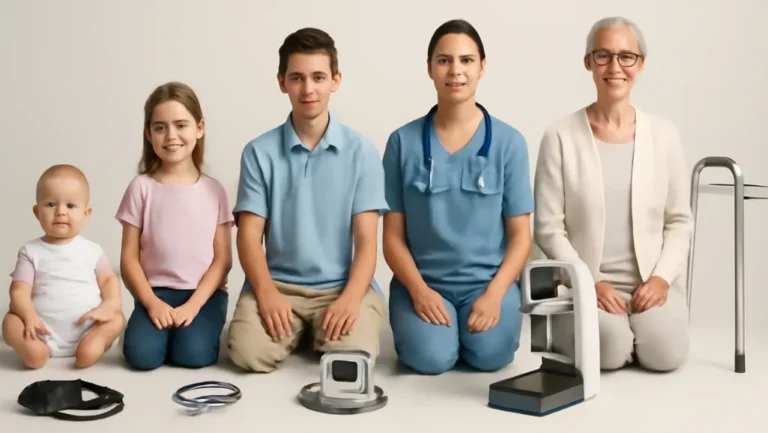

Leave a Comment